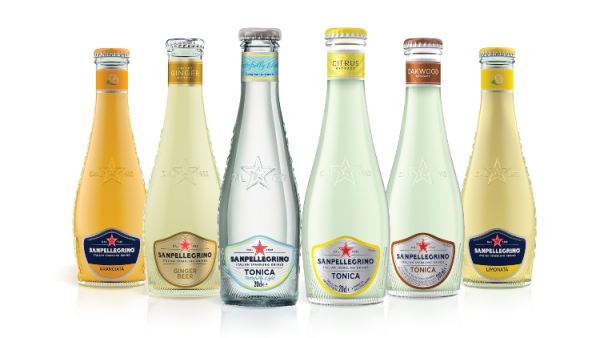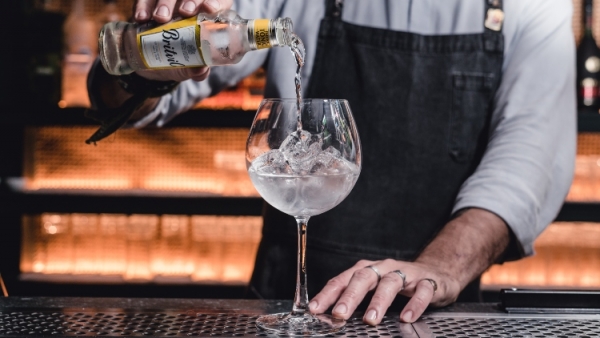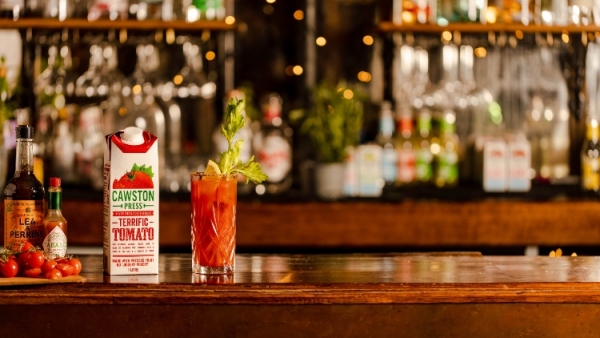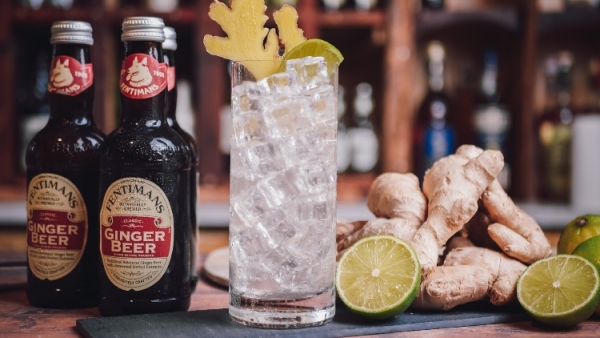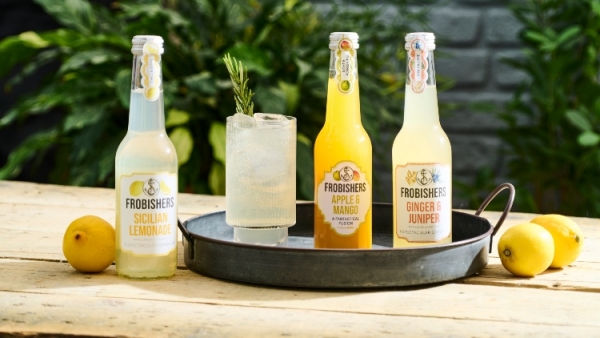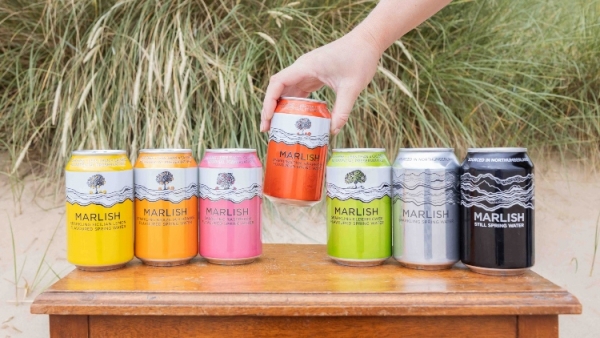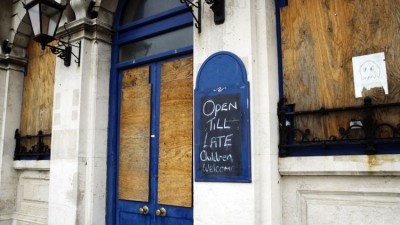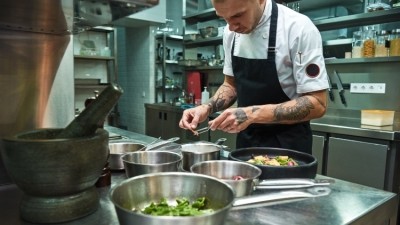Feature – Soft Drinks
FEATURE: Soft drink sales on the rise
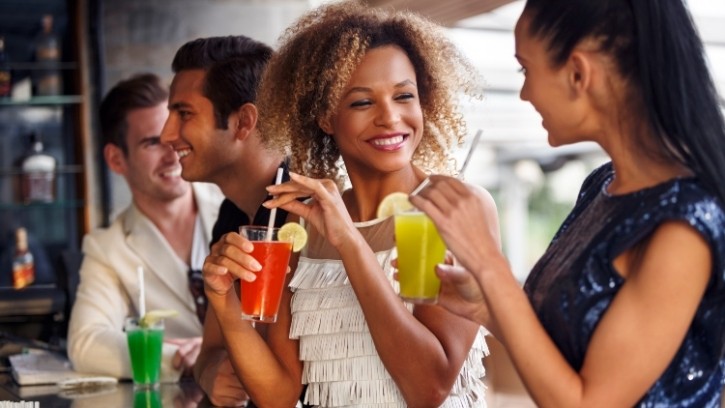
Promotional content: Sanpellegrino
Savour drinking moments in style with premium Sanpellegrino mixers range
As popularity of low and no alcohol serves continue to rise and consumers seek healthier options and enhanced experiences, the premium Sanpellegrino Mixers Range brings 90 years of drinks experience, natural quality ingredients, exceptional citrus heritage and unique sparkling bubbles to the market.
The Sanpellegrino Mixers Range is comprised of six premium sparkling drinks, presented in beautifully premium glass bottles, including Tonica Citrus, Tonica Oakwood, Limonata, Aranciata, Ginger Beer and Tastefully Light Tonic flavours.
The range which can be mixed into cocktails, mocktails or indeed savoured on their own, is designed to enhance early-evening ‘aperitivo moments' and uplift shared drinking occasions with superbly balanced bitter-sweet, crisp and vibrant flavours.
Cocktails and mocktails with the range were mastered this year at Taste of London Festival where Sanpellegrino was the official soft drink sponsor and at a pop-up Piazza Bar on London’s South Bank, where consumers enjoyed the authentic Italian taste of the Sanpellegrino range.
Michela Tasso, Sanpellegrino UK Brand Lead, says: “With early evening consumption from 5 to 8pm – known in Italy as the aperitivo moment – continuing to grow, Sanpellegrino is proud to offer consumers elevated, light and refreshing options from its premium mixers range. We’re renowned for our superior taste, perfect to serve over ice with a slice or mix into a cocktail or mocktail.”
Available to purchase online and in the on-trade directly from Nestle Waters. Get in touch with your distributor or contact us at www.sanpellegrino.com/uk or @sanpellegrino_uk.
While the hot weather evidently stimulated soft drinks sales – they rose by an average of 9% in the first three weeks of the hottest June on record – interest in non-alcoholic is not limited to a heatwave, says Laura Willoughby, founder of mindful drinking movement Club Soda.
“One in three visits to the pub are now alcohol-free and it’s interesting to see soft drinks are benefiting from the fact people are drinking less,” she says.
It’s not time for soft drinks to celebrate yet, however. Although more punters are ordering soft drinks when they visit their local compared to last year, Willoughby warns the category will remain sitting in the shadow of alcohol-free without intervention.
“Soft drinks sales would probably be bigger if it wasn’t for the fact alcohol-free existed,” she adds, pointing to the fact a large number of non-drinkers seek a similar experience to their alcohol-drinking counterparts when they are in the pub, just without the alcohol.
No and low-alcohol beer, cider and spirits are in demand so a sweet, fizzy liquid sprayed into an ice-filled glass no longer cuts it for the grown-ups. Non-drinkers want adult flavours and an “elevated” experience when they go out for a drink she says.
“Soft drinks suffer from the fact people still see them as a compromised drink,” she says, believing soft drinks still haven’t reached their full potential in pubs.
Adam Russell, director of Foodservice and Licensed at Britvic agrees. Britvic’s Soft Drinks Review predicts low and no alcohol on-trade volumes will grow by 48% to 117m litres by 2027, with higher average prices pushing value sales up by 69% to £432m.
“This anticipated growth is why we’re challenging ourselves and licensed venues to rethink soft drinks. We know consumers want compelling non-alcoholic drinks options with a real wow factor – as good as, if not better than, classic alcoholic options.”
The ‘wow factor’
What do soft drinks with ‘a real wow factor’ look like?
“Sophisticated in-house mocktails and exciting flavours like Roasted Pineapple and White Peach & Jasmine Crafted Sodas from The London Essence Company is Russell’s suggestion.
Taking time to create a menu of non-alcoholic cocktails is certainly one way to capture the attention of adult non-drinkers and provide them with the ‘elevated experience’ they seek out-of-home. It also gives them an easy way to trade up and therefore boost the pub’s bottom line.
Monin, which supplies its syrups to the hospitality sector for use in hot beverages and cocktails, says a growing number of consumers would opt for a non-alcoholic cocktail if a pub offered one. It points to CGA by NIQ’s Mixed Drinks Report 2023, which found 32% of British adults would drink a virgin cocktail if a pub or similar venue sold it.
Pressed fruit juice company Cawston Press is already on the case in supporting pubs to create non-alcoholic cocktails with ease. Earlier this year, it launched a 1-litre range of pressed juices – including flavours Sweet Pineapple, Crisp Cranberry and Terrific Tomato – specifically for the on-trade.
To help pubs come up with creative alcohol-free cocktails, the cartons feature recipes like the Cawston Cosmo and a classic Bloody Mary.
“With 48% of consumers typically spending more on higher quality drinks on-premise, these variants allow for perfect mixing, along with great tasting pure juices, and have a 15-month shelf life,” enthuses Cawston Press marketing director Kat Jones.
For those who haven’t got the time or inclination for liquid alchemy, there is a simpler way to show care towards softs and give non-drinkers a decent alternative to alcohol.
“Premium glassware, quality ice and fresh garnish can elevate the pour,” adds Charlotte Stainforth, marketing and brand manager for on-trade soft drinks brand Frobishers.
Fentimans, which supplies 275ml softs and 200ml mixers to the on-trade, has similar suggestions. It teamed up with former bartender Elena Urbani to create ‘Perfect Soft Serves’ for pubs.
Suggestions include serving some of its top sellers Ginger Beer, Rose Lemonade and Victorian Lemonade in different styles of glassware and with garnishes. It proposes serving its Ginger Beer in a small highball, with a slice of fresh ginger and lime wedge, for example.
Belvoir Farm, well known for its fruit cordials, is another brand making it easy for pubs to provide interesting serves without the fuss. This month, it has launched a range of ready-to-drink non-alcoholic cocktails, including a Lime & Yuzu Mojito and Peach Bellini, in cans “giving the on-trade much more versatility, which is the key to make the fridge space work harder for the pub,” says Belvoir Farm founder Pev Manners.
Simply stocking “a wide range of alcohol-free options to those not wanting to drink” is what’s important to Brighton-based Good Times Pubs & Bars. The seven-strong pub group, which includes the Railway at Portslade and the Basketmakers Arms in Brighton, has a broad selection of soft drinks to cater to the growing number of non-drinkers, says head of marketing Stephen Langley.
Its range includes offerings from Fentimans, Frobishers and Cawston Press alongside more traditional options such as Coca-Cola and Appletiser. The majority are stocked in bottles, cans or cartons in glass-fronted fridges making it easy for customers to see what’s available and increasing the chances of them trying something new.
Fentimans director of marketing Jayne Andrews says stocking a wide variety of drinks and servings also ensures non-drinkers have less of an excuse to switch to water after their initial soft drink if they have accompanied alcohol drinkers for a long drinking session, or are eating.
“By making it hard to choose just one, consumers will come back for more,” she says, although “the most important thing is ensuring the first serve is as good as it can be in terms of liquid and presentation”.
“This will help in driving consumers back for another on the same visit or at very least, ensure they visit again.”
Andrews notes securing a national listing with Mitchells & Butlers in the past year has been a win-win for both. While the pub group has broadened its soft drinks offering, the listing has helped Fentimans sales grow 18% in the on-trade.
Cost pressures
Stocking a wide variety, investing in glassware, garnishes and training staff to make the perfect ‘elevated’ pour can all help shift more soft drinks. However, with increasing cost pressures weighing heavily on pub operator’s shoulders, how can they capitalise in this area without spending out too much on stock?
Having a “soft drinks offering that can work day to night is vital”, says Stainforth of Frobishers who suggests fruit juices for earlier in the day and sparkling drinks for evening and occasion drinking.
Versatility over variety is the key. “Soft drinks that can be sold as a mixer to a premium spirit or crafted into a show-stopping cocktail save valuable fridge space,” she adds.
This is a strategy working for pub company Star Pubs & Bars according to its soft drinks category buyer Ben Ko-Nkengmo.
“Where possible and fitting, soft drinks should be multi-purpose so they can be used as interesting mixers,” he says. “We recently added new premium sodas, tonics and purées to enable licensees to create refreshing profitable spritz serves. On-trend, they are great teamed up with L’Evento Prosecco or Cloud Cover Sauvignon Blanc, to make flavoursome alcoholic drinks too.”
Jones at Cawston Press says the company was mindful of cost pressures for the trade when it launched its 1-litre range of pressed juices earlier this year. It has used “a gentle pasteurisation process” on its pressed juices and purées to give them a 15-month shelf-life.
“The long shelf life offers the convenience of ambient storage while reducing wastage at both a retailer and consumer level. The 1-litre pressed juices are also available in cases of eight rather than six, providing greater convenience for storage,” she explains.
This move, conversely has led to longer term conversations and new contracts for Cawston Press as a whole, says Jones. The brand, which also offers Sparkling Fruit Drinks in 330ml cans and 250ml bottles, and Fruit Waters in 200ml cartons, has added 1,300 new points of distribution in the hospitality sector so far this year.
Creating house sodas is another move some pubs are adopting to meet multiple consumer demands around soft drinks in a more cost-effective way.
Britvic recently partnered with Mitchells & Butlers to create its non-alcoholic house soda range. It’s “simply” a measure of Teisseire syrup mixed with soda water and served over ice in a premium glass with garnish, explains Russell, who notes its success as it ticks multiple boxes, “including premiumisation, health, elevated experiences, personalisation and value for money”.
“It’s also a great opportunity for an upsell, if the pub can sign-post the slightly more expensive (but tasty) option,” says Andrews of Fentimans, also working with customers in this area.
Healthy choices
House sodas are also typically lower in sugar than ready-made soft drinks, which also appeals to adult non-drinkers, says Willoughby of Club Soda.
“A big driver for people going alcohol-free is sugar,” she says. The primary question visitors to its Covent Garden shop – The Club Soda Tasting Room – ask is around the sweet stuff.
“They want to know what they can drink that won’t be packed full of sugar because they assume that an alcohol-free drink is full of it,” she says.
Willoughby says Square Root sodas, which are very low in sugar and use natural ingredients, are top sellers. She also suggests flavoured tonics and shrubs – syrups made with fruit, aromatics, sugar and vinegar – as great low sugar alternatives.
“Shrubs come as ready to drink or as cordials – the benefit of the latter is they make a great cocktail ingredient as well as mixed with soda or sparkling wine for a spritz,” she says. “It is a very elevated adult offer and they go really well with food and especially dessert.”
Nonsuch, the brand founded by Aspall Cyder and Vinegar’s Henry Chevallier, is her top recommendation. The brand currently produces four shrub syrups and was a winner of two trophies and a gold medal in the 2023 World Alcohol Free Awards.
Many soft drinks brands are conscious of consumers’ reticence towards sugar and were already focused on reducing its presence six years ago ahead of the introduction of the sugar tax in 2018.
Latest publicised concerns from the World Health Organisation (WHO) around aspartame means consumers may avoid artificially sweetened drinks too, so pubs have added pressure to find suitable alternatives.
Joe Evans, director and co-founder of Northumberland-based Marlish, which produces a range of sugar-free (sucralose is used for sweetness), low-calorie tonics, mixers and sparkling spring waters, has seen his brand grow by 88% in the past nine months, “driven predominantly by the on-trade”.
“In fact, the appetite for the brand within pubs and bars has been so great that, in June, we expanded our range of tonics and mixers and started producing the best-selling varietals – English Tonic Water, Premium Lemonade, Soda Water and Ginger Ale – in a 150ml can format,” he says.
Fentimans is another responding to growing thirst for healthier soft drinks. In response to “a greater number of consumers becoming more health conscious” it is about to launch a new functional drinks line – Botanical Boost. With a lighter flavour than “typical Fentimans drinks”, it is designed to aid digestion and contains vitamins for a natural energy boost.
Marlish’s Evans, who has just expanded his Spring Waters range with a Pink Grapefruit variant, notes that consumer interest in premium, healthier soft drinks has been “growing consistently for the past few years”.
“But with more people choosing to drink less but better, the need for a wider choice has also become hugely important.”
Choice is certainly something pubs will need to offer but the primary aim should be to provide the best experience as is possible, believes Melanie Ginsberg, UK head of marketing at London Essence.
“The large proportion of consumers willing to explore healthier soft drinks and low/no alcoholic options should not have to compromise on taste,” she says, adding style of serve is also important.
There is lots to consider, but with expectations in many areas and pubs facing ongoing pressures, it will certainly be a balancing act to find the sweet spot for soft drinks.
